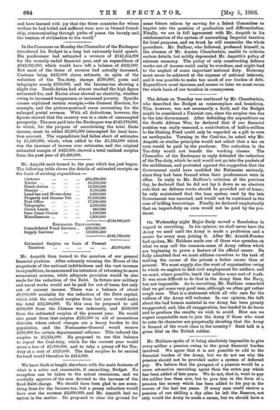Mr. Asquith then turned to the question of our general
financial position. After solemnly warning the House of the magnitude of the national indebtedness and the vast increase in expenditure, be announced his intention of returning to more economical courses, while adequate provision would be also made for the reduction of the Debt. In future new military and naval works would not be paid for out of loans, but only out of current income. There was a balance of about £9,000,000 available for the reduction of the Debt capital, which with the realised surplus from last year would make the total £12,500,000. To this sum he proposed to add £500,000 from the Chinese war indemnity, and £500,000 from the estimated surplus of the present year. He would also grant from that surplus £135,000 in aid of necessitous districts where school charges are a heavy burden to the population, and the Postmaster-General would receive £105,000 for certain departmental reforms. This reduced the surplus to £2,334,000. He proposed to use this balance to repeal the Coal-duty, which for the current year would mean a loss of £1,000,000, and to take a penny off the Tea- duty at a cost of £920,000. The final surplus to be carried forward would therefore be £414,000.








































 Previous page
Previous page